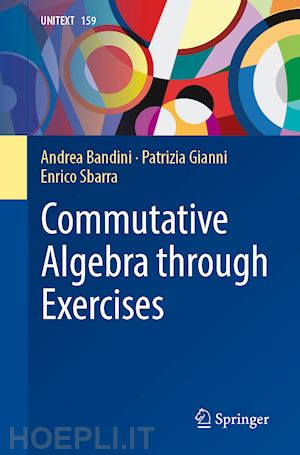
Questo prodotto usufruisce delle SPEDIZIONI GRATIS
selezionando l'opzione Corriere Veloce in fase di ordine.
Pagabile anche con Carta della cultura giovani e del merito, 18App Bonus Cultura e Carta del Docente
This book provides a first introduction to the fundamental concepts of commutative algebra. What sets it apart from other textbooks is the extensive collection of 400 solved exercises, providing readers with the opportunity to apply theoretical knowledge to practical problem solving, fostering a deeper and more thorough understanding of the subject.
The topics presented here are not commonly found in a single text. Consequently, the first part presents definitions, properties, and results crucial for understanding and solving the exercises, serving also as a valuable reference. The second part contains the exercises and a section titled with "True or False?" questions, which serves as a valid self-assessment test. Considerable effort has been invested in crafting solutions that provide the essential details, aiming for a well-balanced presentation. We intend to guide students systematically through the challenging process of writing mathematical proofs with formal correctness and clarity.
Our approach is constructive, aiming to illustrate concepts by applying them to the analysis of multivariate polynomial rings and modules over a principal ideal domain (PID) whenever feasible. Algorithms for computing these objects facilitate the generation of diverse examples. In particular, the structure of finitely generated modules over a PID is analyzed using the Smith canonical form of matrices. Furthermore, various properties of polynomial rings are investigated through the application of Buchberger’s Algorithm for computing Gröbner bases.
This book is intended for advanced undergraduates or master’s students, assuming only basic knowledge of finite fields, Abelian groups, and linear algebra. This approach aims to inspire the curiosity of readers and encourages them to find their own proofs while providing detailed solutions to support their learning. It also provides students with the necessary tools to pursue more advanced studies in commutative algebra and related subjects.
Part I Theory.- 1 Rings.- 2 The Ring K[x1, . . . , xn].- 3 Affine Algebraic Varieties.- 4 Modules.- 5 Tensor Product.- 6 Localization.- 7 Noetherian and Artinian Rings. Primary Decomposition.- Part II Exercises.- 8 Rings and Ideals.- 9 Polynomials, Gröbner Bases, Resultant, and Varieties.- 10 Modules.- 11 Tensor Product.- 12 Localization.- 13 Noetherian and Artinian Modules.- 14 True or False?.- 15 Review Exercises.- Part III Proofs and Solutions.- 16 Proofs of Theoretical Results.- 17 Solutions to the Exercises.
Andrea Bandini is an associate professor of algebra at the Department of Mathematics of the University of Pisa. He has taught several courses in basic algebra, commutative algebra, and number theory. His research interests mainly concern algebraic number theory and arithmetic geometry.
Patrizia Gianni is a professor of algebra specializing in computer algebra and is recognized for her contributions to Gröbner bases and computational real algebraic geometry. She played a key role in the development of the Axiom computer algebra system.
Enrico Sbarra received his doctorate in Germany at the University Duisburg-Essen under the supervision of Jürgen Herzog. After collaborating with the Universities of Trieste, Bochum and Genoa, since 2008, he has been a researcher in algebra and a lecturer at the Department of Mathematics in Pisa. He is the author of several papers published in prominent international journals. His research interests include combinatorial and commutative algebra, with applications to algebraic geometry.











Il sito utilizza cookie ed altri strumenti di tracciamento che raccolgono informazioni dal dispositivo dell’utente. Oltre ai cookie tecnici ed analitici aggregati, strettamente necessari per il funzionamento di questo sito web, previo consenso dell’utente possono essere installati cookie di profilazione e marketing e cookie dei social media. Cliccando su “Accetto tutti i cookie” saranno attivate tutte le categorie di cookie. Per accettare solo deterninate categorie di cookie, cliccare invece su “Impostazioni cookie”. Chiudendo il banner o continuando a navigare saranno installati solo cookie tecnici. Per maggiori dettagli, consultare la Cookie Policy.